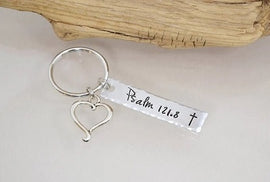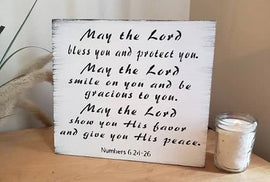20 Powerful Bible Verses about Forgiveness

Bible Verses about Forgiveness

Forgiveness is one of the things that sets believers in Christ apart from the rest of the world. Many people believe that forgiveness is a nice thing to do, but only if it benefits their relationships. For those who are considered an enemy, there is no earthly motivation to forgive apart from Christ.
We know that Christ forgave us of more than we could ever deserve, and in return, we show that same love to those around us. So how do we do this? Here are some of the most significant things the Bible has to say about forgiveness.
Table of Contents
Bible verses about God’s Forgiveness
The following Bible verses about God's Forgiveness will help you to understand that all you need to ask and you will be forgiven.

-
Isaiah 55:7
Let the wicked forsake his way, and the unrighteous man his thoughts: and let him return unto the Lord, and he will have mercy upon him; and to our God, for he will abundantly pardon.
Throughout the Scriptures, you can find verses where God is calling his people back to him. He tells them to repent from evil ways and embrace righteousness. But his forgiveness is not dependent on our actions. God is a merciful God whose forgiveness is an outpouring of his love. He doesn’t forgive us begrudgingly - He does so abundantly and with joy.
-
2 Chronicles 7:14
If my people, which are called by my name, shall humble themselves, and pray, and seek my face, and turn from their wicked ways; then will I hear from heaven, and will forgive their sin, and will heal their land.
The Old Testament gives us a myriad of stories about how God interacted with the nation of Israel, his chosen people. There is a collective nature to his relationship with them. He tells them to return to him, and he will heal their land. But, on the contrary, there are times when he puts them into exile to remind them of their dependence on him and draw them into repentance.
While we as individuals function differently than the nation of Israel, these verses are still a good reminder that God is constantly calling us into repentance.
His forgiveness is not based on our worthiness, but our relationship with him does go two ways. He treats us with great patience when we stray. He will not force us to love him, but he will draw near to us intimately when we come to him with humble hearts.

-
Daniel 9:9
To the Lord our God belong mercies and forgiveness, though we have rebelled against him;
Forgiveness is such a tenant of our faith BECAUSE of who God is. He doesn’t forgive because he has to. He forgives because he is merciful in his very nature. Though we, in our humanity, do not always possess the same mercy or wisdom, he helps us to regard others with those same traits.
-
Hebrews 8:12
For I will be merciful to their unrighteousness, and their sins and their iniquities will I remember no more.
We often hear the phrase, “forgive and forget.” The term has become cliche and trite because we know how impossible it truly feels to move on after being hurt. Some don’t like the phrase because simply shoving the feelings down without addressing the pain can be unhealthy. But that’s not what God does with our sin.
He doesn’t make every mark of it vanish without any consequence. Often we experience a relational rift between him or our friends when we break their trust. God doesn’t simply forget our sin ever happened, as if it carried no weight.
Instead, God pardons us from the punishment of our sin. He no longer counts it against us. When we reach heaven, it will no longer be our sin that determines whether we are worthy to enter the kingdom. When Hebrews says he will remember our iniquities no more, it means he has washed us clean with the blood of the Lamb, and we are free from condemnation.
He doesn’t just awkwardly pretend it never happened. The Father acknowledges the weight of our sin; the Son has borne it on the cross and paid the ultimate price so that the Spirit can dwell in our hearts and sanctify us in His power. It is our Father’s love that makes these truths carry far more meaning than just “forgive and forget.”

-
Isaiah 1:18
Come now, and let us reason together, saith the Lord: though your sins be as scarlet, they shall be as white as snow; though they be red like crimson, they shall be as wool.
Sometimes we talk about forgiveness so much in the church that the word seems to lose its meaning. When we are told to forgive others, it’s easy to either flippantly let it go or begrudgingly forgive out of obligation. Neither of those reflects the true heart of forgiveness God shows us.
The ancient Israelites may have understood the weight of their sin far better than we do, even if they didn’t know the whole gospel yet. It was a regular part of their worship to sacrifice animals to pardon their sins.
They saw the death that was required when they strayed from God. They knew how bloody the altar got when it was time for the sacrifice. They knew that it was only God’s grace that allowed them to sacrifice an animal in their place. And even though they didn’t know the Lamb of God yet, they knew their need for Him.
So when the writer of Isaiah was recording his myriad of messianic prophecies, this one stands out. This is a proclamation of hope. Even when the temple flowed with streams of animal blood, redemption was available. God would wash their sins white as snow and pure as wool.
There would not be a single stain left when God was done saving His people. Knowing what we know now, we can rejoice at the work Jesus did and hold fast to the forgiveness that God has already offered us through His Son.
Bible Verses about Forgiveness of Others:

-
Luke 17:3-4
Take heed to yourselves: If thy brother trespass against thee, rebuke him; and if he repent, forgive him. And if he trespass against thee seven times in a day, and seven times in a day turn again to thee, saying, I repent; thou shalt forgive him.
From the Old Testament Prophets to John the Baptist, the Bible shares a message of repentance. We are urged to acknowledge our sin and repent before God and each other.
Many times throughout Scripture, it is this repentant heart that leads Christ to say, “your sins are forgiven.” Since we are told to treat others in this same way, we are to forgive those who repent.
If those around us need to be called out, this verse says it is good to rebuke them. However, this is not a rebuke based on pride or judgment - it is out of love for our brothers. Sometimes our anger at being wronged can get in the way. But if this brother continues to sin and yet keeps coming back in repentance, we are to keep forgiving because that’s what Christ did for us!
-
Matthew 6:14
For if ye forgive men their trespasses, your heavenly Father will also forgive you
This verse is not meant to be an ultimatum. It’s not threatening us or saying that God might not forgive us. This verse is meant to convict us when we take advantage of God’s abundant forgiveness while withholding forgiveness from those around us. His forgiveness is not like an elitist club where only the most popular or most high class get forgiven.
This verse doesn’t say that only those who go to church and are baptized can be forgiven. Instead, it is a free gift, given abundantly and meant to be passed on to those around us just as freely. Do not praise God for His forgiveness of you if you are going to turn around and treat your brother with an unforgiving heart!

-
Matthew 18:21-22
Then came Peter to him, and said, Lord, how oft shall my brother sin against me, and I forgive him? Till seven times? Jesus saith unto him, I say not unto thee, Until seven times: but, Until seventy times seven.
This conversation between Peter and Jesus has become well known. Though it may seem extreme at first glance, Jesus makes his point effectively. The disciples and Pharisees often asked Jesus how much or little they had to do, and Jesus often responded by shifting the perspective.
Peter wanted to know how many times he had to forgive before he could stop, but Jesus uses these large numbers to state that we should never have an attitude of ceasing to forgive. Instead, we should forgive freely and abundantly because that is how we have been forgiven.
Bible verses about Asking for Forgiveness.
We found some comforting Bible verses about asking for forgiveness, I hope the scripture below can help you.
-
James 5:16
Confess your faults one to another, and pray one for another, that ye may be healed. The effectual fervent prayer of a righteous man availeth much.
Repentance and forgiveness were meant to be done in community. We were never meant to struggle alone. When we have sinned against ourselves or others, James tells us to confess to each other because we can pray for each other and seek healing in the act of repentance. Even the sin struggles that so easily threaten to undo us can be conquered by prayer and through community.

-
1 John 1:9
If we confess our sins, he is faithful and just to forgive us our sins, and to cleanse us from all unrighteousness.
It’s easy to feel shame when we sin or stray from God. This shame too often silences us. Like Adam and Eve in the garden, our first instinct is to hide. We see the deep depravity of our own hearts and we fear that we will be rejected or cast out by God or those around us. So we hide and we distance ourselves from God.
But God wants us to come to Him! He promises us that when we confess our sins to him, he will not cast us away. Instead, he will forgive us and wash that sin away for good. He is faithful to us even when we break our promises or mess things up. He doesn’t ask us to be perfect, he just asks us to come to him and confess.
-
Mark 11:25
And when ye stand praying, forgive, if ye have ought against any: that your Father also which is in heaven may forgive you your trespasses.
When we spend time confessing our sins to the Lord, part of the process is examining our hearts for any wrong thoughts or attitudes we may hold. One of these attitudes could be unforgiveness we hold against someone. The Bible tells us that we shouldn’t hold grudges or dissension with people. We are never to be instigators of unjust disunity.
So, this verse instructs us to confess those things to God and be intentional to repair relational rifts we may have with those around us. We should listen to the Holy Spirit’s conviction and take steps to rectify broken relationships so we can approach the Lord without anything getting in the way.

-
Psalms 51:10
Create in me a clean heart, O God; and renew a right spirit within me.
In the Old Testament, David was called a man after God’s own heart. That doesn’t mean he was perfectly righteous all the time. In fact, David made some of the most well-known mistakes in the Bible. He was a sinful man. And yet, the thing that sets him apart as a man after God’s heart is that he always came back to God.
Even after his transgression with Bathsheba, and his conversation with Nathan, these were the words He said to God. He confesses his sin, shows repentance, and asks God to make it right. He knows he has no power to deal with his sin on his own, and he surrenders to God’s power within him. This shows us that we can always come before the Lord, even when we know we’ve messed up badly.
-
Ephesians 4:32
And be ye kind one to another, tenderhearted, forgiving one another, even as God for Christ's sake hath forgiven you.
Part of the process of modelling this verse in our Christian communities is having humility. If we are supposed to forgive each other, we also need to be willing to confess our sins to one another and ask for forgiveness. This verse goes both ways.
Those who have been wronged can show kindness and tenderheartedness by letting go of minor grievances. And those who have hurt members of their community can show kindness and tenderheartedness by asking for grace even when they know they don’t fully deserve it.
Bible Verses about Mistakes and Forgiveness
Below are selected bible verses about making mistakes and forgiving them. We are all human and all make mistakes so I hope these scriptures below will help you understand.

-
Luke 6:37
Judge not, and ye shall not be judged: condemn not, and ye shall not be condemned: forgive, and ye shall be forgiven
We have no place to judge others because we are imperfect and sinful beings ourselves. We sin by doing intentionally wrong things, and we sin by doing unintentionally bad things. Sometimes we even sin by NOT doing something we should have done.
We make sinful mistakes every day, so we are in no place to condemn others. Our place is to trust God to be the judge, accept His forgiveness, and forgive others.
-
Luke 7:47
Wherefore I say unto thee, Her sins, which are many, are forgiven; for she loved much: but to whom little is forgiven, the same loveth little.
In this story, when a worldly woman was approaching Jesus at a Pharisee’s house, the religious leaders are murmuring to each other about how sinful she was. But, instead of condemning her as the religious leaders did, Jesus forgives her and embraces her with kindness and compassion.
He uses it as a teaching opportunity to show the Pharisees that the people who have been forgiven the most are often the people who are most transformed because they knew their need for salvation.
The woman in this story was living a lifestyle that went against God’s plan. We don’t know why or how she got into it, but we know that sinful behavior often stems from our sense of desperation or isolation. Those feelings are valid, but sin is not the correct response.
When we respond to real feelings with sinful behavior, we often feel our need for salvation most deeply. Don’t run from that feeling because it’s uncomfortable - let it lead you to your Savior. When you are forgiven much, you are able to love much.

-
Romans 8:1
There is therefore now no condemnation to them which are in Christ Jesus, who walk not after the flesh, but after the Spirit.
When we make mistakes, or when those around us make mistakes, it’s easy to feel angry or bitter. Even if the action was not meant to hurt, there are still consequences that can be hard to live with. This is when we are easily drawn to feel condemnation towards others or ourselves.
But the hope of the gospel is that there is no longer any condemnation for those who are in Christ. They live by a new law where their flesh is no longer the strongest force. We walk in the Spirit now, where there is freedom from sin and freedom from the death that comes with sin.
Bible Verses about Forgiveness of Self
Here are some scriptures about forgiving yourself so you can move on and have assurance that you have been forgive by God.

-
Psalm 65:3
Iniquities prevail against me: as for our transgressions, thou shalt purge them away.
One of the hardest things to do can be to forgive ourselves when we know how truly sinful we are. This is when verses like this can be of comfort. Here the Psalmist reminds us of the truth that even when our sins and transgressions overwhelm us, God has wiped them clean from our record and no longer condemns us. Therefore, we have no reason to condemn ourselves.
-
Romans 4:5
But to him that worketh not, but believeth on him that justifieth the ungodly, his faith is counted for righteousness.
One of the hardest things to accept can be that God’s abundant forgiveness is free. Of course, we don’t deserve it, but sometimes we fear we need to do something to earn it. This verse in Romans reminds us that it is not because of our own works that Christ has given us His righteousness. We can do nothing to pay for it. We need to stop trying to repay Him for this gift and just receive the forgiveness he offers so freely to his children!

-
Colossians 1:13-14
Who hath delivered us from the power of darkness, and hath translated us into the kingdom of his dear Son: In whom we have redemption through his blood, even the forgiveness of sins
When we get stuck in self-pity, self-condemnation, or feelings of defeat, it is this truth we must meditate on. When we get angry at ourselves for messing up again, we can combat that by praying for God to restore a sense of peace. We believe in a holy God who is faithful even when we are not.
He has delivered us, freed us, and forgiven us. We are redeemed through his blood and blessed by his grace. The church believes this is our new identity. So instead of identifying yourself by your sin, you are free to identify with His righteousness.

-
2 Corinthians 5:17
Therefore if any man be in Christ, he is a new creature: old things are passed away; behold, all things are become new.
This is the best news we could get. Our sin has been conquered, our flesh has been put to death, and our old self has passed away. Now, we are new creatures, free from the sin that once so easily entangled us. When we struggle to forgive ourselves, this is a verse we be encouraged by, knowing that this is the truth even when we feel discouraged or defeated.
In conclusion:
The Bible has a lot to say on forgiveness. It tells us of God’s forgiving heart, it tells us to forgive others, and it even holds some truths that instruct us on how we can let go of our own self-condemnation. If there is one truth that sets our faith apart, it’s this free gift of forgiveness that radically shifts our relationships with God and changes our life. Let us set our sight on the author and perfector of our faith. When we set our minds on these truths, everything else doesn’t matter so much. These verses can guide you as you seek to reflect God’s heart to those around you this week!
SHARE:






















